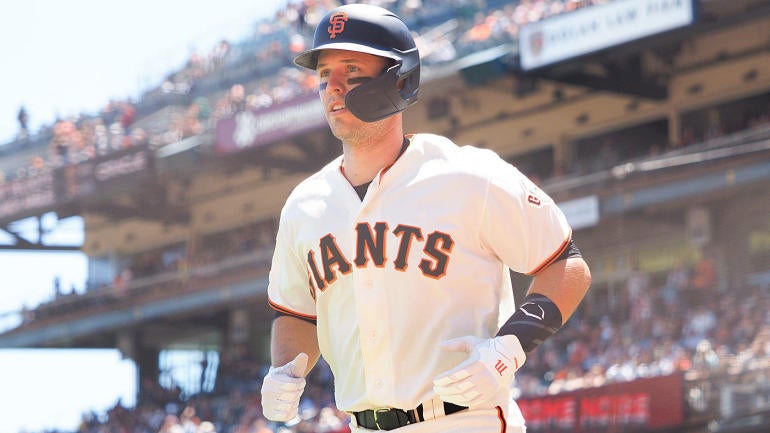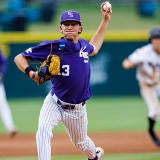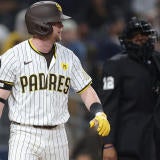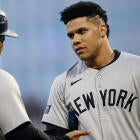
Buster Posey, one of the greatest catchers of his generation and the greatest catcher in San Francisco Giants history, officially announced his retirement from baseball during a press conference Thursday evening at Oracle Park.
"The reason I'm retiring is I want to be able to do more stuff from February through November with my family," Posey said Thursday. "Physically, it's much harder now. And to be honest, it's harder to enjoy it as much with the physical pain on a daily basis."
Posey, 34, opted out of the 2020 season because of the pandemic, then enjoyed a resurgent 2021. He hit .304/.390/.499 with 18 home runs in 454 plate appearances as the Giants won an MLB-leading 107 games. It was his best season since his peak years in the early-2010s. Posey joins Matt Cain, Jim Davenport, Scott Garrelts, and Robby Thompson as the only players to play at least 10 years in the big leagues, and spend their entire career with San Francisco.
After 12 years with the #SFGiants, Buster Posey has announced he is retiring from baseball.
— SFGiants (@SFGiants) November 4, 2021
Thank you for everything, Buster! #ForeverGiant pic.twitter.com/6pU59Tj3nH
"It doesn't take long to realize that some organizations are better than others. This is a first class organization," Posey said about the Giants and their fans Thursday. "... To the fans, thank you for all your support I received the last 13 seasons. I look forward to creating new memories of my own and sharing them with family and friends as I pull for the Giants the rest of my life."
To be sure, Posey is going out at the top of his game. He joins Lou Brock, Will Clark, Roberto Clemente, David Ortiz, and Kirby Puckett as the only players to hit .300 in their final seasons in MLB's divisional play era (1969 to present), according to ESPN Stats & Info. He certainly did not limp to the finish like many longtime catchers.
Drafted No. 5 overall in 2008, Posey made his MLB debut in Sept. 2009, then took as over as San Francisco's starting catcher in May 2010. He authored a .305/.357/.505 batting line with 18 home runs in 443 plate appearances that year, earning Rookie of the Year honors, and was a stalwart behind the plate during the club's World Series runs in 2010, 2012, and 2014.
"To me, this is what encapsulates baseball: it's a lot more than winning or losing games. It's about the time spent with family. The countless nights and days pulling for your team, riding the emotions of the highs, riding the emotions of the lows," Posey said Thursday. "And ultimately enjoying the people that you're with and making great memories together. I'm so very humbled to have played a part in those memories."
Posey's best season was 2012, when he hit .336/.408/.549 with 24 home runs in 610 plate appearances. He led baseball in batting average and OPS+ despite the wear of tear of being a catcher, which earned him the NL MVP award. Posey was a seven-time All-Star and retires as a career .302/.372/.460 hitter with 158 home runs in parts of 12 seasons.
When the time comes, Posey will receive serious consideration for the Hall of Fame at a minimum. He was the best offensive catcher of his era and one of the best players in baseball in the 2010s regardless of position. The 2010-19 WAR leaderboard:
- Mike Trout: 73.1 WAR
- Buster Posey: 52.9 WAR
- Joey Votto: 48.0 WAR
- Andrew McCutchen: 46.4 WAR
- Robinson Cano: 46.3 WAR
WAR is not everything, particularly with catcher defense so difficult to quantify, but a number that big is tough to ignore. Posey was the game's best all-around backstop for a decade or so, and he accomplished just about everything a player could hope to accomplish in this game. Championships, individual awards, generational wealth, the works.
Replacing even post-peak Posey will be difficult, if not impossible. The Giants could turn to top prospect Joey Bart behind the plate next season, or venture out into free agency or the trade market. Bart, the No. 2 pick in 2018, hit .294/.358/.472 in 67 Triple-A games this year, and has appeared in 35 MLB games the last two seasons.
This was final guaranteed year on the eight-year, $159 million contract Posey signed in March 2013. The contract included a $22 million club option for 2022, which the Giants would have had to exercise or decline by Sunday. Now that is not necessary.
























